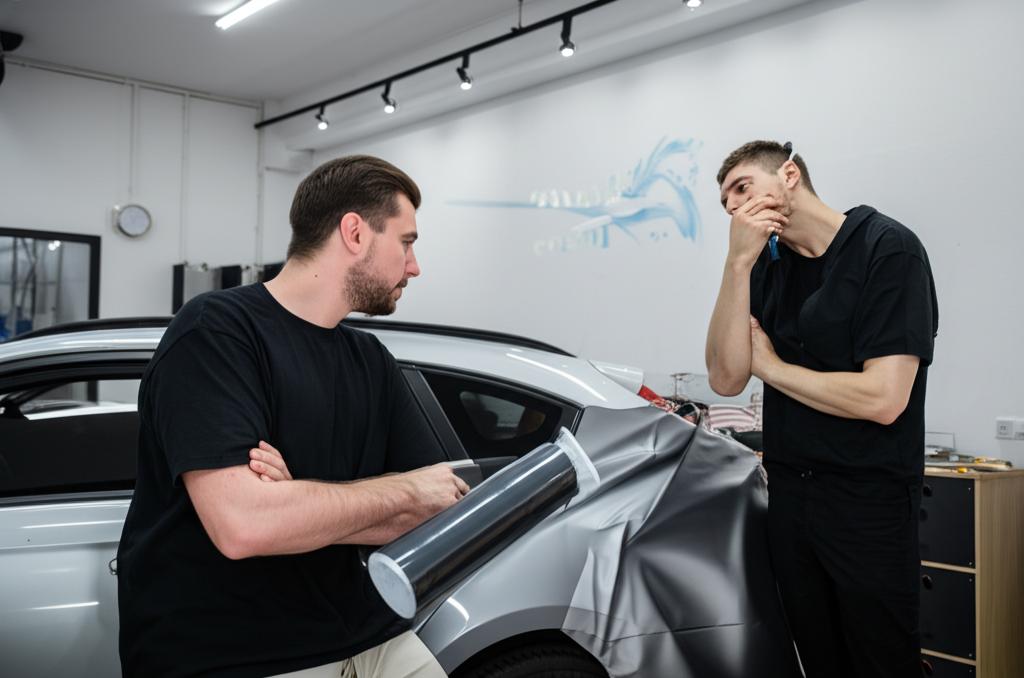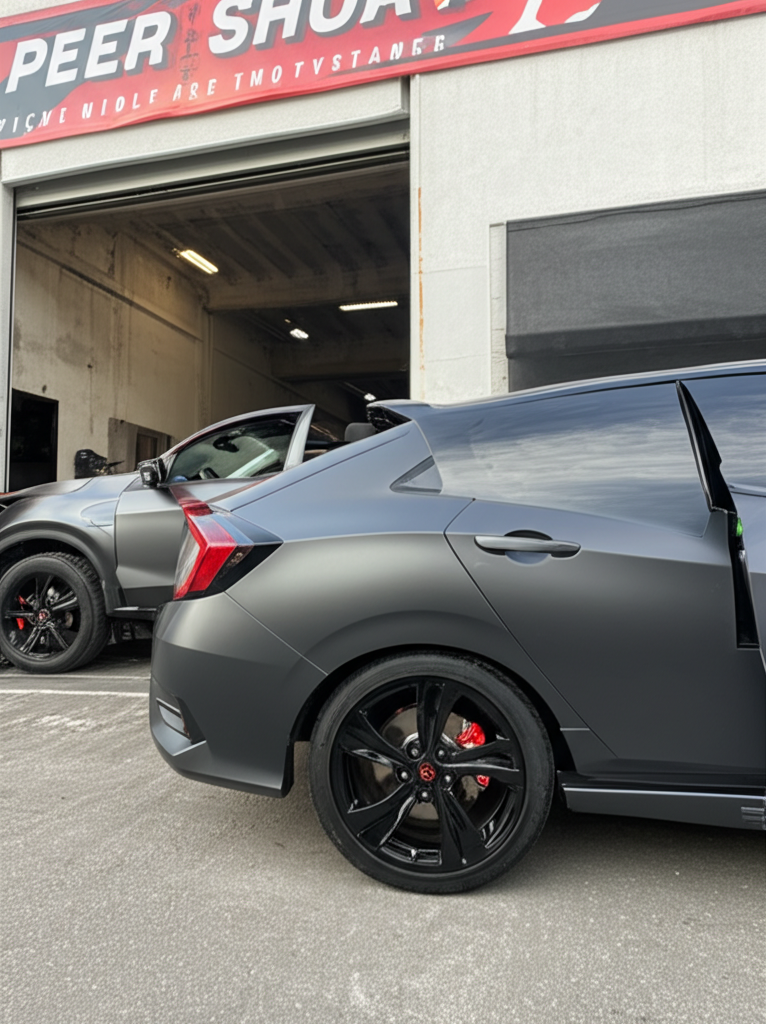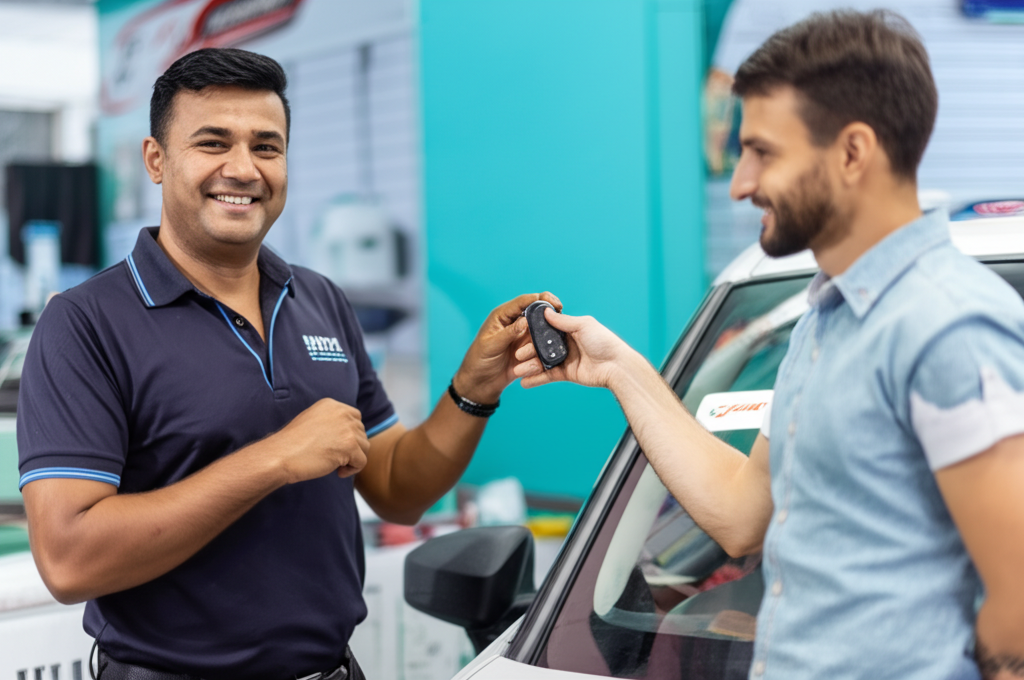Running a car wash or detailing shop in Thailand, you know the scene: a customer walks in, excited about changing their car’s colour or protecting the paint. They’ve heard about car wraps, maybe seen some stunning examples cruising through Bangkok. Then comes the inevitable question: “Which wrap film is better? What’s the difference between TPU and PVC?” You try to explain, but maybe the details get fuzzy, the benefits aren’t clear, and you see the customer’s initial excitement turn into confusion. You know there’s a difference in quality and price, but articulating *why* one costs more and *what* benefits it brings can be challenging, potentially costing you a valuable upsell or even the job itself. This guide is designed for *you*, the shop owner, to confidently and clearly explain the crucial differences between TPU and PVC films, empowering you to educate your customers and guide them to the best choice for their needs and budget.

Let’s consider a common scenario. Khun Anand recently bought a new Honda Civic. He loves the car but wants a unique matte grey finish and protection against the everyday scratches and environmental challenges of driving in Thailand – from tight parking spots in malls to debris on the highway. He visited a local shop, initially leaning towards a cheaper PVC option because the price seemed attractive. However, the shop owner took the time to walk him through the differences. Using samples and clear explanations, the owner highlighted how TPU (Thermoplastic Polyurethane) offered superior self-healing properties, better conformability around the Civic’s curves, and significantly longer-lasting protection and colour stability compared to traditional PVC (Polyvinyl Chloride) wraps. Khun Anand learned that while PVC could achieve the colour change, it wouldn’t offer the same level of paint protection, might show ‘orange peel’ texture more easily, and would likely need replacement sooner, especially under the strong Thai sun. Seeing the tangible benefits of scratch resistance and the smooth finish of TPU, Khun Anand decided the long-term value and peace of mind were worth the higher initial investment. The result? A stunning matte grey Civic that looks factory-finished, protected against minor damages, and a very happy customer who understands *why* he chose TPU and appreciates the shop’s expert guidance.

Having a simple, clear comparison chart can be incredibly helpful when talking to customers. It breaks down the technical details into easy-to-understand benefits. Here’s a table you can adapt or use directly in your customer consultations:
| Feature | TPU (Thermoplastic Polyurethane) | PVC (Polyvinyl Chloride) |
|---|---|---|
| Material Type | Advanced polymer known for flexibility and durability. Often used in high-end paint protection films (PPF) and premium colour wraps. | A more common plastic, available in various forms (cast or calendered). Widely used for signage and vehicle graphics. |
| Durability & Scratch Resistance | Excellent. Highly resistant to scratches, stone chips, and abrasions. Protects the underlying paint effectively. | Moderate to Poor. More susceptible to scratches and minor impacts. Offers minimal paint protection compared to TPU. |
| Self-Healing Properties | Yes (Common feature). Minor scratches and swirl marks disappear with heat (sunlight or heat gun). | No. Scratches remain permanent. |
| Finish & Clarity | Superior. Generally smoother, higher gloss (or deeper matte), less ‘orange peel’ texture. Excellent clarity for PPF. | Good to Fair. Can sometimes exhibit more ‘orange peel’ texture. Clarity is less of a focus than colour. |
| Flexibility & Conformability | Excellent. Stretches easily and conforms tightly to complex curves and edges without distortion or lifting. | Fair to Good (Cast PVC is better than Calendered). Can be harder to apply on deep recesses and compound curves. May require relief cuts or patches. |
| UV Resistance & Yellowing | Very Good. High resistance to UV degradation, yellowing, and cracking over time. Maintains colour integrity longer. | Fair. Can become brittle, crack, or yellow over time, especially lower-quality calendered PVC, accelerated by strong sunlight. |
| Lifespan (Typical in Thai Climate) | 5-10 years or more, depending on quality and maintenance. | 2-5 years, sometimes less for calendered PVC or under harsh conditions. |
| Ease of Removal | Generally cleaner removal, less adhesive residue if removed within its lifespan. High-quality TPU is designed not to harm OEM paint. | Can be more difficult to remove cleanly, especially after prolonged sun exposure. May leave significant adhesive residue or potentially damage paint if low quality or improperly removed. |
| Environmental Impact | Often considered slightly more environmentally friendly in production and disposal compared to PVC, contains fewer harmful plasticizers. | Production involves chlorine; disposal can be problematic. Plasticizers used can be harsh. |
| Price Point | Premium. Significantly higher material and installation cost. | Budget-friendly to Mid-range. Lower material cost. |
| Ideal Customer / Use Case | Customers seeking the best protection, longest lifespan, flawless finish, self-healing benefits. Ideal for new or high-value cars, full wraps, PPF applications. Willing to invest in quality. | Customers primarily focused on aesthetic change, short-term applications, budget constraints. Suitable for flat surfaces, partial wraps, temporary promotions. |
In essence: TPU is the premium choice for longevity, protection, and finish quality. It acts like a shield that also looks great. PVC is a more economical option primarily for changing aesthetics, but with compromises on durability, finish, and paint protection. Explaining this trade-off clearly helps customers align their expectations with their budget and desired outcome.
Hearing from other car owners can solidify the message. Here are a few snippets reflecting common sentiments:
“I was hesitant about the price of TPU at first, but after six months driving around Bangkok, my car still looks brand new. No small scratches from bikes squeezing past, no fading. Worth every Baht for the peace of mind!” – Preeya, Mercedes C-Class Owner
“My friend went with a cheap PVC wrap, and it started peeling at the edges after just one year. I chose TPU based on my detailer’s advice, and the finish is incredible, so smooth! It feels like quality.” – Chai, Toyota Fortuner Owner
“I wanted a specific colour change for my weekend car. The shop explained PVC would work, but TPU would look better and protect the original paint underneath perfectly. Seeing the difference side-by-side made the decision easy. I feel much better knowing the paint is safe.” – Michael, Mazda MX-5 Owner
These comments highlight the shift from initial cost concern to long-term satisfaction, pride in appearance, and the value placed on protection – key emotional drivers you can tap into during your consultations.
Now you have a clearer picture of the TPU vs. PVC landscape. Use this knowledge! Print the comparison table, show customers high-quality photos of both finishes (and perhaps examples of failed PVC wraps), and explain the long-term value proposition of TPU. When you confidently articulate the differences, you build trust, position yourself as an expert, and help customers make informed decisions they’ll be happy with for years to come. This elevates your service beyond just installation – you become a trusted advisor.
Want to discuss specific brands, installation techniques, or how to best integrate this into your customer conversations? Reach out!
📱 Want to learn more about car wrap & paint protection?
Feel free to reach us on LINE:

🌐 Official Website: https://tpuwraps.com
- Q: Is TPU film really worth the significantly higher price compared to PVC?
- A: It depends on the customer’s priorities. If they value long-term paint protection, superior finish quality (less ‘orange peel’), self-healing properties against minor scratches, and durability (5-10 years), then TPU is often worth the investment, especially on newer or high-value vehicles. If the primary goal is a short-term, budget-friendly colour change (2-4 years) and paint protection isn’t the main concern, then PVC might be sufficient. Think of it as investing in long-lasting armour versus a temporary costume.
- Q: How long does it typically take to wrap a car in Thailand?
- A: A full wrap on a standard sedan generally takes 3 to 5 days. This includes thorough cleaning and preparation, meticulous installation, and post-installation checks. Complex vehicles, intricate designs, or higher quality films like TPU might take slightly longer to ensure a perfect finish, especially ensuring all edges and curves are flawless.
- Q: Can car wraps, especially PVC, damage the original paint?
- A: High-quality wraps (both TPU and premium cast PVC) applied and removed correctly by experienced professionals should not damage factory OEM paint. However, problems can arise with low-quality PVC films, poor installation techniques, or attempting removal after the film has degraded significantly (become brittle or adhesive has failed). Pre-existing paint issues (like poor resprays) can also be affected during removal. This is why choosing a reputable installer and quality materials is crucial.
- Q: How should I advise my customers to care for their wrapped car?
- A: Caring for a wrap is similar to caring for paint, but with a few key points. Recommend regular hand washing with pH-neutral soap. Avoid automatic car washes with harsh brushes. Don’t use abrasive polishes or cutting compounds. For matte wraps, avoid waxing or polishing, using specific matte care products instead. Promptly remove bird droppings, insects, and fuel spills as they can etch the film. For TPU with self-healing, minor scratches often disappear on their own in the sun or with gentle heat.
- Q: Are there different qualities even within TPU or PVC categories?
- A: Absolutely. Within PVC, there’s a big difference between ‘calendered’ (thicker, less conformable, shorter lifespan, cheaper) and ‘cast’ (thinner, more conformable, more durable, better finish, more expensive) films. Within TPU, while generally high-quality, there are variations in thickness (affecting protection level), top coat technology (hydrophobicity, stain resistance), and warranty duration offered by different manufacturers. Always clarify the specific type and brand of film being used.
Understanding the nuances between TPU and PVC car wraps is more than just technical knowledge; it’s a powerful tool for your business. By clearly and confidently explaining these differences, you empower your customers to make informed choices that align with their needs and expectations. This transparency builds trust, justifies premium pricing for superior products like TPU, and reduces the likelihood of future dissatisfaction. Educated customers become happy customers, and happy customers lead to positive reviews, referrals, and a stronger reputation for your shop in the competitive Thai market. Embrace your role as an expert advisor, use this guide to refine your consultations, and watch your wrap business thrive.
